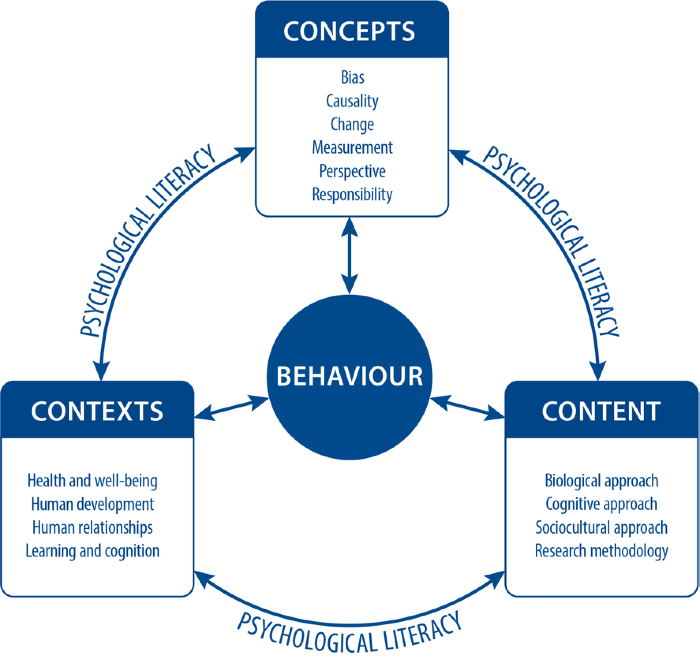
To summarise the new syllabus in comparison to the current syllabus:
- Changes to the subject content are minimal.
- There are significant changes to the overall structure of the course.
- Class practicals have been introduced.
- The new syllabus is more application-focused and encourages students to understand the connections between topics, deepening their overall understanding of psychology.
Structure:
The new syllabus is structured very differently from the current syllabus. The new ss is divided into three main areas: Concepts, Content, and Contexts.
Figure 2: An overview of the DP psychology course: concepts, content, and contexts. Psychology Guide (FA 2027), p. 19
The biological, cognitive, and sociocultural approaches remain, but along wiresearch methods, they now come under the heading of ‘Content’. The four option topics from the current syllabus have been replaced by 4 contexts: Health and well-being (which replaces abnormal psychology and health psychology, aiming to reflect the modern idea that mental and physical health are inextricably linked), human development, human relationships, and learning and cognition. A significant change is that both SL and HL students are required to study all 4 of the contexts, in comparison to the 1 (SL) or 2 (HL) options they study for the current syllabus. Finally, the new syllabus contains 6 concepts: bias, causality, change, measurement, perspective, and responsibility. A key consideration for teachers will be how to organise and structure the delivery of the course. The new syllabus clearly states that the content, contexts, and concepts are not designed to be taught separately. Students should be encouraged to make links between different aspects of the course. In doing so, they will develop their psychological literacy, which includes understanding the scientific research process, acting ethically, and thinking critically. That said, similarly to the current syllabus, it would be logical to teach key elements of the content (biological, cognitive, and sociocultural approaches) before teaching the contexts, as the purpose of the contexts is to apply core psychological theory to real-world settings. For example, within the health and well-being context, students study one biological treatment for one disorder. This would require some prior understanding of the biological approach. Links could then be made here between the content and the context. However, the concepts and the research methods especially can be integrated throughout. For example, elements of the concept of ‘change’ could be covered alongside the prevention and treatment section of the health and well-being context, or sampling techniques could be taught as part of the preparation for the class practical.Syllabus Outline
| Syllabus component | Teaching hours | |
|---|---|---|
| SL | HL | |
| Concepts, Content, and Contexts | ||
| Integrating concepts and content in the understanding of Contexts | 100 | 100 |
| Class practicals (minimum four) | 30 | 30 |
| Extensions (HL only) | ||
| The role of culture, motivation, and technology in shaping human behaviour | n/a | 45 |
| Data analysis and interpretation | n/a | 45 |
| Internal assessment | ||
| Psychology research proposal to investigate a population of interest in using one of the four research methods used in the class practicals. | 20 | 20 |
| Total teaching hours | 150 | 240 |
Syllabus outline. Adapted from Psychology Guide (FA 2027), p 17
Download New IB DP Psychology Syllabus
Overview
Teachers should be assured that changes to the psychological content of the course are minimal. The biological, cognitive, and sociocultural approaches all include some new additions, but much of the content for the approaches remains similar to that of the current syllabus. Likewise, many of the topics included within the contexts of the new syllabus are recognisable from the current syllabus. The health and well-being, human development, and human relationships contexts bear many similarities to the abnormal psychology, health psychology, developmental psychology, and human relationships options of the current syllabus. Even the newly introduced learning and cognition context includes topics covered under the cognitive and sociocultural approaches of the current syllabus. Whilst the concepts are an addition to the structure of the new syllabus, many of these topics are also present in the current syllabus. The change here is that they will need to be taught in a more explicit way, and students will need to be guided to apply them to the content and contexts across the course. The new syllabus also sees changes to the HL extension topics. Rather than being extensions to knowledge of the core approaches, they are now broader ideas that can be applied to the contexts throughout the course.Assessment Outline
| Assessment component | SL Weighting | HL Weighting |
|---|---|---|
|
Paper 1 (1 hour 30 minutes) Integration of the concepts, content, and contexts (35 marks) Section A: two compulsory short-answer questions from two of the three content areas Section B: two compulsory short-answer questions asking students to apply their knowledge of content to an unseen situation, each from one of four contexts Section C: students answer one of two concept-based extended response questions, each from a different context |
35% | 25% |
|
Paper 2 (1 hour 30 minutes) Applying concepts and content to research contexts (35 marks) Section A: four compulsory questions that focus on the class practicals Section B: evaluation of an unseen research study about two or more concepts |
35% | 25% |
|
Paper 3 (1 hour 45 minutes) Data analysis and interpretation of research data (30 marks) Four source-based questions with quantitative and qualitative findings will be provided. The focus of the questions will be on one of the HL extensions. |
n/a | 30% |
|
Internal Assessment (20 hours) Research proposal (24 marks) Design a research proposal to investigate a population of interest using one of the four Research methods used in the class practicals. This component is internally assessed by the teacher and externally moderated. |
30% | 20% |
SL & HL assessment outline. Adapted from Psychology Guide (FA 2027), p 42 & 43.
Internal Assessment and Class Practicals The IA of the new syllabus bears resemblance to the IA of the current syllabus, in that students will write a research-based report with the subheadings of: introduction, research methodology, data collection, and discussion. However, a key difference is that students will now only propose the research; they will not actually conduct the study. This will allow them to be more ambitious with their proposals and design research that they may not have the skills or time to actually carry out. Students will still have the opportunity to carry out research through 4 class practicals included within each of the contexts. For health and wellbeing, they are asked to conduct interviews, for human development, observations, for human relationships, surveys or questionnaires, and for learning and cognition, an experiment. These practicals can either be teacher-led or student-led. Students are encouraged to write a brief summary of each practical, which will assist them with questions on the Paper 2 exam. External Assessment There are also significant changes to the external assessment papers and questions. SL and HL students will take Papers 1 and 2, both of which assess concepts, content, and contexts, thereby further encouraging the links between them. Paper 2 will also include an evaluation of an unseen research study. Similarly to the current external assessment, only HL students will take Paper 3, and this focuses on research methods (data analysis and interpretation of data to be specific). Paper 3 will also address one of the HL extension topics. Overall, teachers of the current syllabus should be reassured that the content changes are minimal, and that many of their current teaching resources are likely to still have some relevance. However, time needs to be taken to think about how to structure the delivery of the content, contexts and concepts, ensuring that students have the opportunity to develop a deep understanding of the links between them. Consideration as to how and when to carry out the class practicals will be important, and time will be needed to become familiar with the new assessment materials and marking guides. I hope this article gives a good overview of the syllabus changes. Best wishes for preparing for and delivering the new course!Join me in our upcoming free webinar as I explore the updates in the Psychology Guide and their effects on teaching and learning.

What’s New in the IB DP Psychology Guide for 2027: Essential Updates & Expert Insights
Register NowThe Learning Management Digest
Subscribe today to receive our latest resources, events, updates and so much more – specially curated for you, and delivered straight to your inbox.

